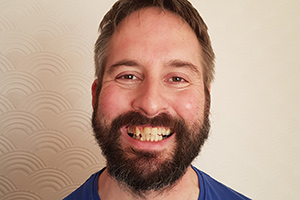
Studying A Very Peculiar Practice
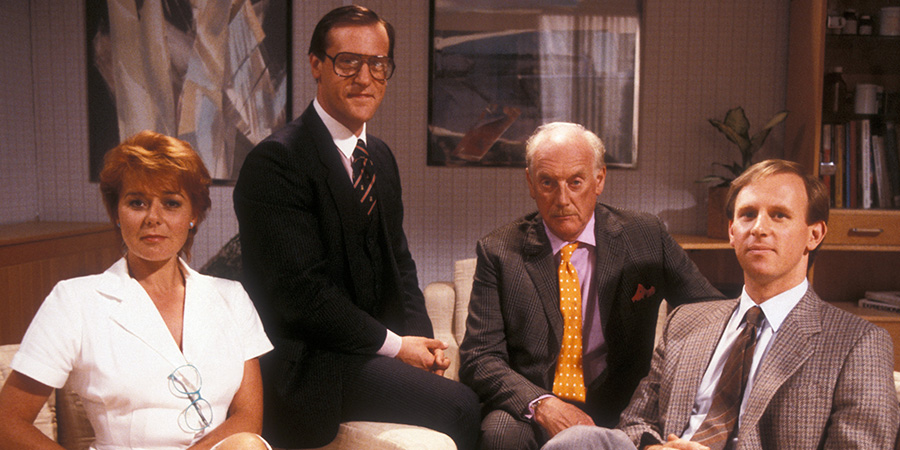
"Let me tell you about this terrible place, Stephen. They call it a 'New University', but it's twenty years old now. Concrete's crumbling, silly flat rooves leak. We've got a repair budget four times the total salary bill." - Dr Bob Buzzard
Starting a new job is never easy and for young doctor Stephen Daker (Peter Davison) the experience is more disorientating than for most. Arriving at a remote campus to take up his new position at the University of Lowlands' medical centre, Daker soon finds his idealism threatened by an unholy combination of cynical, backbiting colleagues, brutal Thatcherite economic realities and, most bizarrely, two surreal, ever-present nuns. For this was May 1986 and BBC viewers were being introduced to the world of A Very Peculiar Practice for the very first time. Over the course of two seven-part series (as well as one belated Screen One special) it would develop into one of the finest British comedy drama series ever made.
It is through the idealistic Stephen that we soon meet the other jaded members of the fictional Lowlands University Health Centre. Initially mistaking the new arrival for a patient, Stephen's immediate superior, Dr Jock McCannon (Graham Crowden), though long in the tooth and over reliant on the bottle, is the most genial member of staff. But even he warns early on that cuts to the higher education budget have transformed the university into "a swamp of fear and loathing" and that he should not trust either of his two new colleagues.
On the face of it, the brash Dr Bob Buzzard (David Troughton) seems very much like part of the problem: privileged, cynical and far more interested in playing squash and getting involved in "get rich quick" schemes than actually helping anyone, he is openly contemptuous and deeply patronising towards colleagues and patients alike. Buzzard hates the university, regarding it as "a terrible place" and "like a very, very inefficient sector of British industry": "Top management are totally corrupt and idle, middle management are incompetent and idle and the workforce are bolshy and idle. And, of course, there's no bloody product!" He completely lacks any sort of bedside manner ("I hate hearing people talk about their personal problems") and would doubtless be monstrous if he actually existed in real life. David Troughton nevertheless infuses his performance as Buzzard with so much comic charm that we miss him whenever he's not on screen.
Then, there is Dr Rose Marie (Barbara Flynn), an aggressively ambitious feminist, who as we soon learn, is not above deploying her feminine wiles to advance her career. "What we think of as illness is something men do to women," she tells one female patient and we soon learn that Jock's dire warnings about his colleagues plotting against him are not unjustified. According to Peter Davison, Flynn, who played the part to perfection, was only cast at the last minute after the previous actress cast in the role (who he doesn't name) proved unsuitable.
Then in his thirties, Peter Davison was already familiar to viewers for playing a very different kind of Doctor, namely the fifth manifestation of Doctor Who. He was also well known for another medical role, that of unorthodox vet, Tristan Farnon in the BBC's long-running adaptation of James Herriot's All Creatures Great And Small stories. There is, incidentally, am odd, presumably entirely accidental Doctor Who connection between all of the main cast: not only had both Davison himself and Troughton's father, Patrick, famously enjoyed three-year stints in the TARDIS, but Graham Crowden had been offered the role in 1974, before Tom Baker took the part instead. Troughton himself had, in fact, previously appeared in the 1972 Doctor Who story The Curse Of Peladon, and in due course both he and Barbara Flynn would feature in the sci-fi series after its revival in 2005.
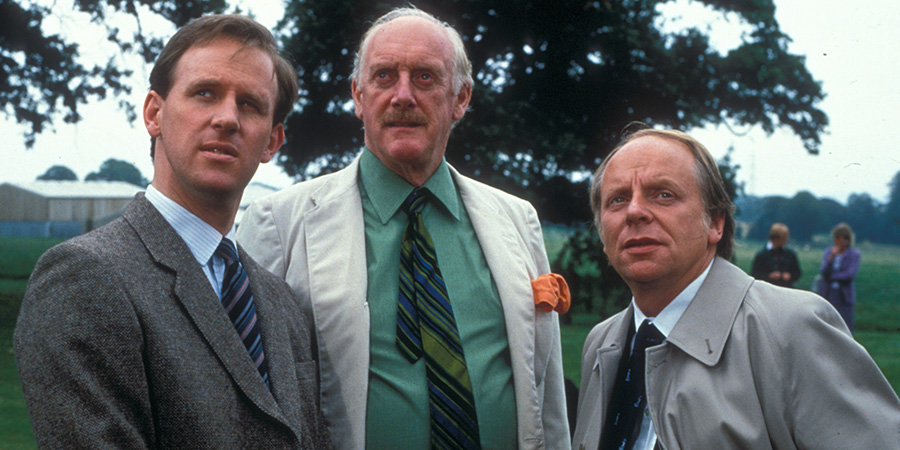
John Bird as the oddly-titled Vice Chancellor Ernest Hemmingway completes the impression of an education system being totally distorted by the then-fashionable whims of Thatcherite free market economics. Hemmingway seems entirely preoccupied by an overriding obsession with attracting wealthy Japanese investors.
Not everyone at the university is awful, however. The recently divorced Stephen soon develops a romance with postgraduate policewoman, Lyn Turtle. Lyn was played by Amanda Hillwood, the wife of American actor Matt Frewer, then best known for playing the iconic 1980s figure Max Headroom. Takashi Kawahara also provides amiable support as Daker's amiable Burmese flatmate, Chen Sang Yau, a maths genius; Lindy Whiteford played the Irish nurse Maureen Gahagan, and Gillian Raine, the widow of the late, great, Leonard Rossiter, was the receptionist.
And then there were nuns. Two of them, in fact, played by Elaine Turrell and Sonia Hart. Neither ever speak or get involved in the main storyline but both are not only the very first people to appear, but can be glimpsed in every single episode. Sometimes they are rummaging through the bins, sometimes they are fishing, sometimes they are listening to music on a ghetto blaster, sometimes they are driving dangerously in a mini. On a few occasions, they even appear in Stephen's dreams. But wherever they are, the two nuns always seem to be behaving in a distinctly un-nun-like manner and add a welcome surreal dimension to the show.
The nuns - along with everything else in the show - were the brainchild of creator, Andrew Davies. Then teaching at the University of Warwick, the BBC had commissioned Davies to write a story about three mature, female students, but after struggling to produce the scripts for three episodes, Davies completely gave up on the idea. The BBC then presented him with a stark choice: write something else for them or pay back his £17,000 fee. Davies did not want to pay the money back. As he later said, "necessity is the mother of invention" and he produced the script for A Very Peculiar Practice instead. Davies inserted a reference to this arrangement into the script for the fifth episode of Series 1 when Stephen encounters a character called Ron Rust (Joe Melia), who tells him he is visiting the university as part of his research for a TV show he is writing because he owes the BBC seventeen thousand quid.
The show marked a turning point for Davies. He had been submitting scripts successfully since the 1960s, but it was the success of A Very Peculiar Practice that enabled him to finally give up the day job at the age of fifty and devote himself to writing for TV full-time.
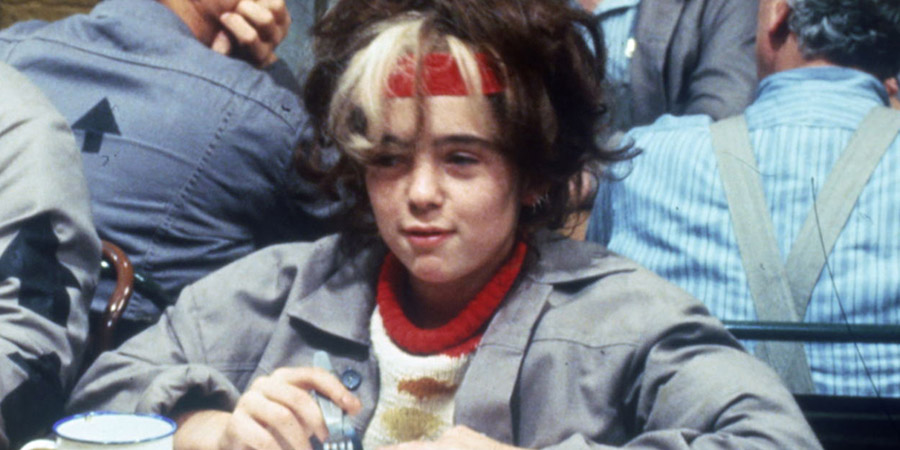
The series marked a change for Davies in other ways too. In recent years, he had become increasingly associated with writing for children, producing dramas for schools programmes (notably the fondly remembered Badger Girl) as well as adapting his own popular Marmalade Atkins books for Children's ITV (pictured). A Very Peculiar Practice fully restored him to the world of the grownups. In what would prove to be an extremely prolific career that has seen him writing well over forty TV drama series (most notably the hugely successful 1995 version of Jane Austen's Pride And Prejudice, starring Colin Firth), A Very Peculiar Practice remains almost the only example of him producing an entirely original screenplay, rather than adapting a work originally produced by somebody else. Davies did, however, write two novels based on the series: A Very Peculiar Practice (1986) and A Very Peculiar Practice: The New Frontier (1988).
The 1980s was something of a boom time for university-based comic dramas with Porterhouse Blue (1987), Small World (1988) and Nice Work (1989) all making the transition from page to screen. This wasn't always helpful. Andrew Davies had always envisaged A Very Peculiar Practice taking place on the grounds of the University of East Anglia. But UAE had been stung before, feeling their reputation had been tarnished through association with the production of satirical drama The History Man (1981), which was based around a lecherous Sociology professor. In the end, exterior shots of Keele and Birmingham were used for A Very Peculiar Practice instead.
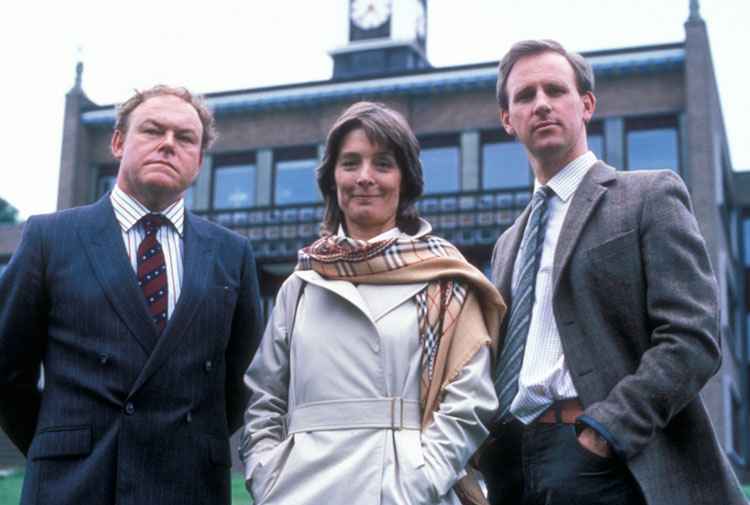
With the series complete, Andrew Davies's debt to the BBC had clearly been repaid. But as the show proved a success, the initial assumption that things would end after one series went out of the window. "The writing was so poignant, so funny - and it was one of the few anti-Thatcher series," said David Troughton. "I'm not sure the BBC realised what gold it had in its hands." A second series of seven episodes was commissioned and aired between February and April 1988.
A few changes had occurred in the interim, with Stephen Daker now appointed head of the practice and his relationship with Lyn ending. Amanda Hillwood's Lyn indeed barely appears at all in Series 2. Instead, Stephen embarks on a new relationship with lively Polish lecturer Greta Grotowska (Joanna Kanska). His old flatmate, Chen Sung Yau, did not return, nor did John Bird's Ernest Hemmingway: replaced as Vice Chancellor by the equally corporate minded and curiously named American, Jack Daniels (Michael J. Shannon).
Although it remains very funny, a portentous feeling of doom hangs over events at the university from the outset of the second series. This mood is born out with a dramatic final episode which seems to provide a definitive and final irreversible conclusion to events at Lowlands.
Yet four years later, A Very Peculiar Practice did return ... in a way. By then increasingly a hot property thanks to greater critical successes like his well-timed Machiavellian adaptation of Michael Dobbs's political thriller, House Of Cards, 1992 saw Davies pen A Very Polish Practice, a one-off sequel broadcast as part of the BBC's popular Screen One anthology series of Sunday night dramas.
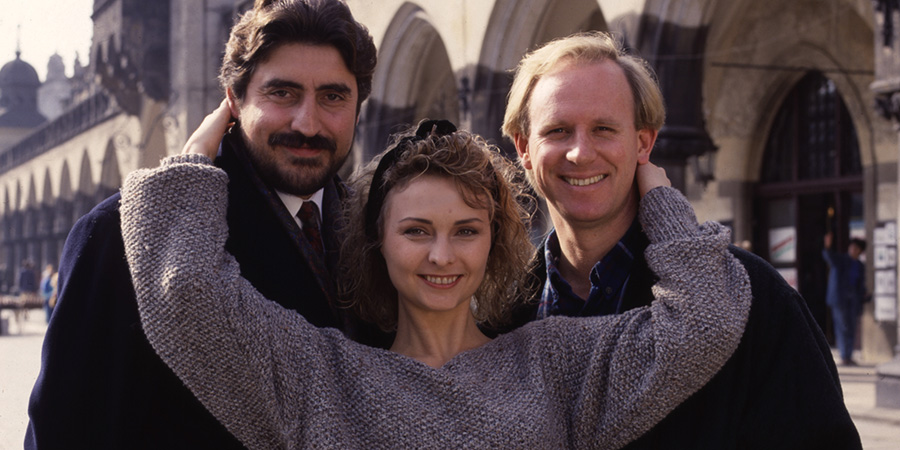
By now, Stephen Daker had settled in post-Communist Poland with Greta and their young son. As a doctor we see him grapple with the corruption and bureaucracy of a health service that is visibly struggling to emerge from the strictures of the Eastern Bloc. He also runs into his old colleague, Bob Buzzard, who is visiting Poland as part of some ill-fated business venture and sees his family life and livelihood threatened by Tadeusz Melnik (Alfred Molina), an old flame of Greta's who has now become a powerful local gangster. Darker in tone than the original series, this proved less successful, partly due to the absence of Barbara Flynn and Graham Crowden from the cast.
Ultimately, while very much a product of the 1980s, A Very Peculiar Practice remains as fresh and watchable today as when it first aired. Politically, its concerns about education and healthcare becoming transformed into just another aspect of the free market remain just as relevant today as they did then. Perhaps only the portrayal of feminism in the form of the manipulative and cold-blooded Rose Marie has stood the test of time less well.
Elsewhere, with great writing, career-best performances from Davison, Crowden, Flynn and Troughton and early screen appearances from the likes of Hugh Grant, Mark Addy and Kathy Burke, this really is well worth a visit.
Book your appointment as soon as possible. In this case, practice really does make perfect.
Where to start?
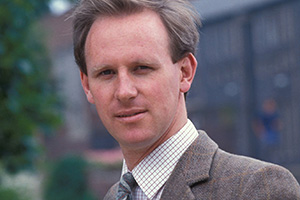
Series 1, Episode 1 - A Very Long Way From Anywhere
With so much continuity in the storyline, it really does make sense to begin at the beginning with the very first episode. We not only get to meet Stephen, his assorted colleagues (including nuns), but also get to see him meeting his future love interest Lyn for the very first time after she rescues him when he runs into difficulties in the university swimming pool. According to Peter Davison, his struggles in the pool were quite genuine: he came close to drowning while filming the sequence.
Help us publish more great content by becoming a BCG Supporter. You'll be backing our mission to champion, celebrate and promote British comedy in all its forms: past, present and future.
We understand times are tough, but if you believe in the power of laughter we'd be honoured to have you join us. Advertising doesn't cover our costs, so every single donation matters and is put to good use. Thank you.
Love comedy? Find out moreA Very Peculiar Practice - The Complete Series

Lowlands University is a swamp of fear and loathing. A showpiece Sixties campus looking increasingly anachronistic in the paranoid, profit-driven Eighties, it is staffed by angst-ridden academics desperate to hang onto their privileged status amid swingeing cutbacks. It also houses what may well be the worst medical practice in the British Isles.
Fresh-faced Stephen Daker (Peter Davison) sees his new job at the Medical Centre as a chance to pursue excellence among a dedicated team. He's somewhat shaken when he meets his colleagues: the once-great Jock McCannon (Graham Crowden), practice head, proponent of alternative psychiatry, and a wildly unpredictable dipsomaniac; public school-educated fascist Bob Buzzard (David Troughton); and Rose Marie (Barbara Flynn), an uber-feminist who sees illness as something men do to women. Dark secrets, sinister experiments, demented academics, STD epidemics, the Yankee Dollar, a desperate Creative with writer's block and a couple of nuns all conspire to make life on campus a hair-raising experience for Stephen.
Andrew Davies's surreal, searingly funny look at sexual politics, medical malpractice and academic rivalry at the height of the Thatcher era won huge acclaim and a BAFTA nomination for Best Drama Series.
This set comprises both series and A Very Polish Practice, the single episode 1992 sequel that finds Stephen coping with life in post-Communist Warsaw.
First released: Monday 10th October 2011
- Distributor: Network
- Region: 2
- Discs: 5
- Catalogue: 7953373
![]() Buy and sell old and new items
Buy and sell old and new items
Search for this product on eBay
BCG may earn commission on sales generated through the links above.
A Very Peculiar Practice

Book based on the hit television series, by its author.
First published: Thursday 1st May 1986
- Publisher: Coronet
- Pages: 272
- Catalogue: 9780340391143
![]() Buy and sell old and new items
Buy and sell old and new items
Search for this product on eBay
BCG may earn commission on sales generated through the links above.
A Very Peculiar Practice: The New Frontier

Second novel by Andrew Davies, based upon his own hit BBC television comedy series.
Dr Stephen Daker returns to Lowlands University, newly elevated to head the Medical Centre in the swamp of fear and loathing. But Lowlands has a new American Vice-Chancellor, Jack Daniels. Handsome, blue eyed, virile, he has a vision of a Brave New University, spearheading the New Knowledge, but also embodying the great eternal values of the Free World. And not only has he the vision: he has the funding too. The medical team respond to new challenges, treating patients for such new ailments as malnutrition, industrial injuries, and Temporary Threshold Loss.
Dr Rose Marie, for example, funs a Male Sexuality Workshop which renders its male members incapable of further misdeeds. Jock McCannon, deeply suspicious of the new regime, finds that the sap still flows in his whisky-marinated old bones. And Stephen falls disastrously for Grete Grotowska, the abrasive art historian, an authority on the male nude but a pill in bed.
Andrew Davies's comedy is as sharp and funny as ever, but his vision of Britain in the late eighties is an alarming one. Lowlands University was dreadful enough as an exhausted repository of shattered dreams; as an Anglo-American success it is hilarious but terrifying.
First published: Thursday 24th March 1988
- Published: Thursday 1st January 1970
- Publisher: Arrow Books
- Pages: 288
- Catalogue: 9780413155207
![]() Buy and sell old and new items
Buy and sell old and new items
Search for this product on eBay
BCG may earn commission on sales generated through the links above.
- Publisher: Methuen Publishing
- Pages: 288
- Catalogue: 9780413155108
![]() Buy and sell old and new items
Buy and sell old and new items
Search for this product on eBay
BCG may earn commission on sales generated through the links above.

